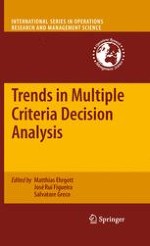2010 | OriginalPaper | Buchkapitel
Robust Ordinal Regression
verfasst von : Salvatore Greco, Roman Słowiński, José Rui Figueira, Vincent Mousseau
Erschienen in: Trends in Multiple Criteria Decision Analysis
Verlag: Springer US
Aktivieren Sie unsere intelligente Suche, um passende Fachinhalte oder Patente zu finden.
Wählen Sie Textabschnitte aus um mit Künstlicher Intelligenz passenden Patente zu finden. powered by
Markieren Sie Textabschnitte, um KI-gestützt weitere passende Inhalte zu finden. powered by
Within disaggregation–aggregation approach,
ordinal regression
aims at inducing parameters of a preference model, for example, parameters of a value function, which represent some holistic preference comparisons of alternatives given by the Decision Maker (DM). Usually, from among many sets of parameters of a preference model representing the preference information given by the DM, only one specific set is selected and used to work out a recommendation. For example, while there exist many value functions representing the holistic preference information given by the DM, only one value function is typically used to recommend the best choice, sorting, or ranking of alternatives. Since the selection of one from among many sets of parameters compatible with the preference information given by the DM is rather arbitrary,
robust ordinal regression
proposes taking into account all the sets of parameters compatible with the preference information, in order to give a recommendation in terms of necessary and possible consequences of applying all the compatible preference models on the considered set of alternatives. In this chapter, we present the basic principle of robust ordinal regression, and the main multiple criteria decision methods to which it has been applied. In particular,
UTA
GMS
and
GRIP
methods are described, dealing with choice and ranking problems, then
UTADIS
GMS
, dealing with sorting (ordinal classification) problems. Next, we present robust ordinal regression applied to Choquet integral for choice, sorting, and ranking problems, with the aim of representing interactions between criteria. This is followed by a characterization of robust ordinal regression applied to outranking methods and to multiple criteria group decisions. Finally, we describe an interactive multiobjective optimization methodology based on robust ordinal regression, and an evolutionary multiobjective optimization method, called
NEMO
, which is also using the principle of robust ordinal regression.
